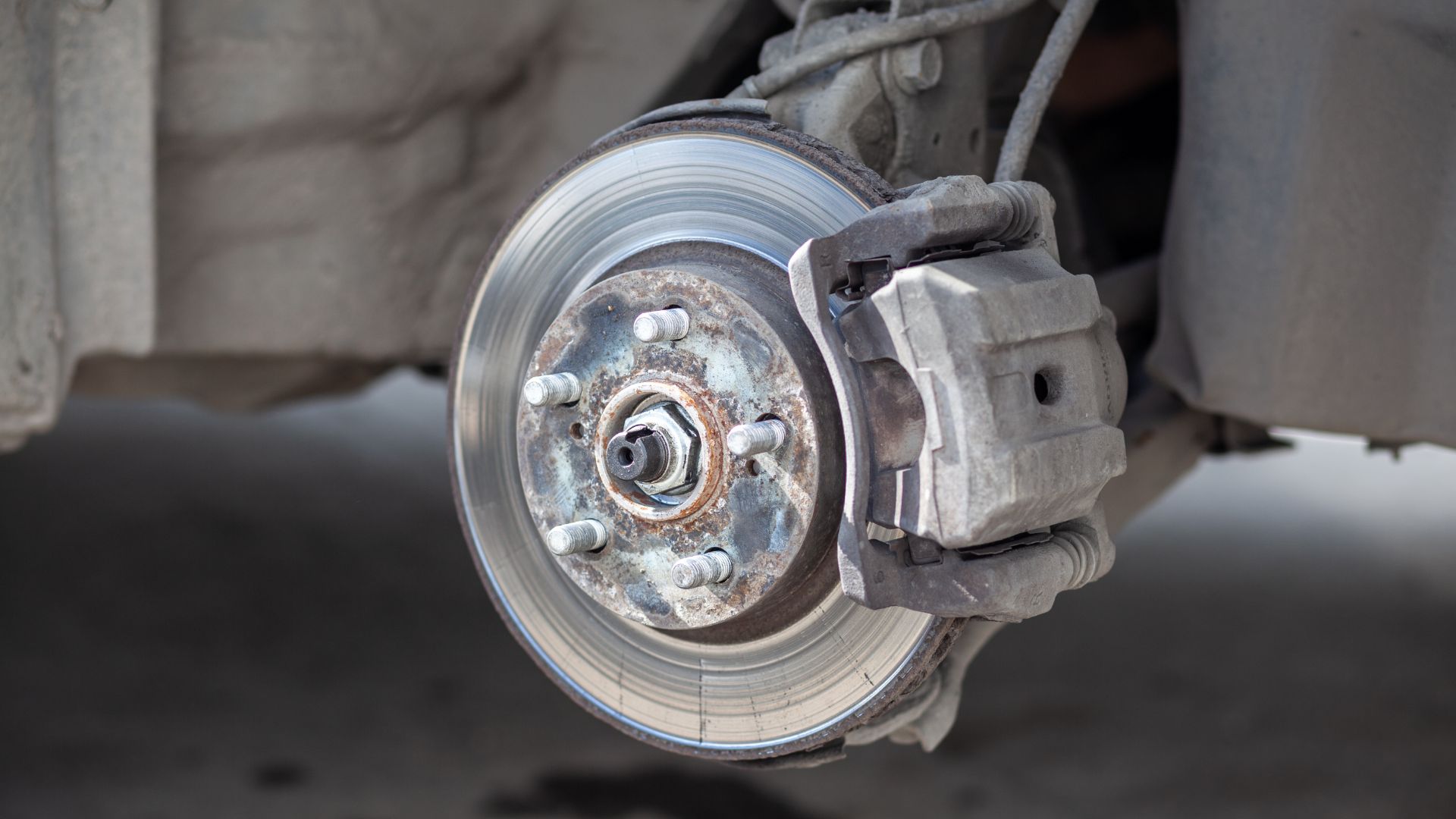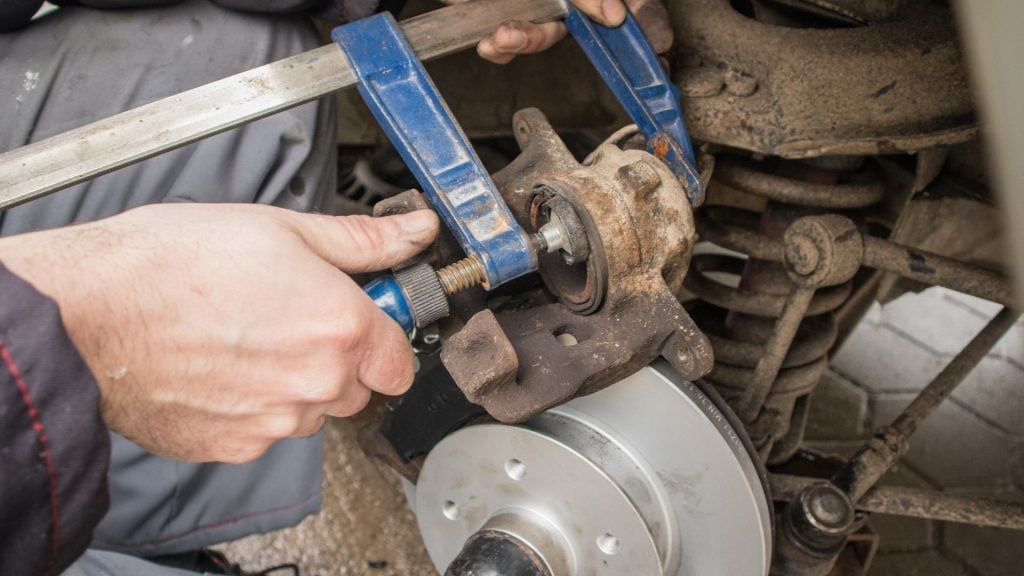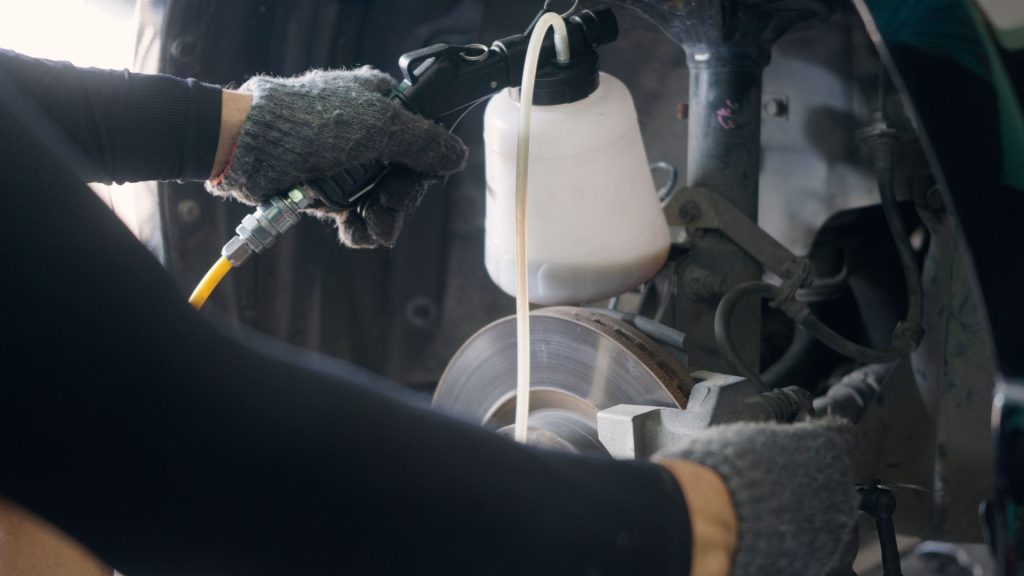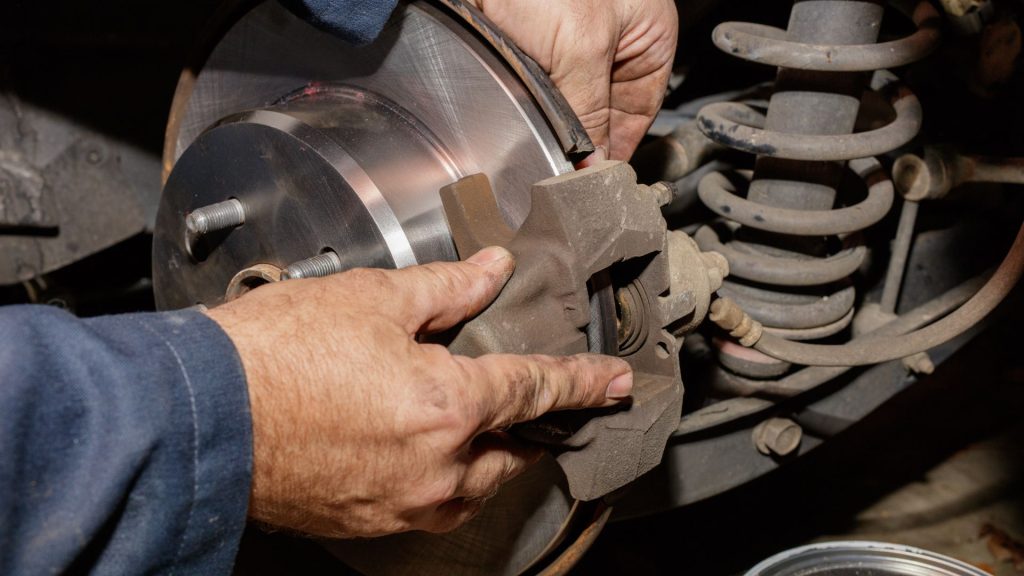Brake caliper sticking — causes and fixes
Fix a sticking brake caliper to ensure road safety.

It is hard to identify a sticking brake caliper until the caliper completely seizes up. Brake caliper sticking can be complicated to diagnose and fix.
The brake system uses fluid to apply pressure on a piston within the brake. This presses into the brake pads and creates friction between the brake rotor and the pad. The friction gradually generates heat, but under normal circumstances, the heat will spread quickly, and your brakes will get you stopped securely.
If you notice that your brakes are giving off a grinding noise or you perceive a burning smell and your vehicle is pulling to the side, it could mean that your brake calipers are sticking. In this article, we will expand on the causes, symptoms, and how to fix a stuck brake caliper.
Causes of a sticking brake caliper

The most prevalent cause of a sticking brake caliper is a rusty caliper piston due to a damaged piston bolt. It can result from stuck brake pads pushing on the brake discs. Just like bad brake booster symptoms, this sometimes evolves into a serious issue due to reduced braking performance. If it is a sticking rear brake caliper, it could result from a damaged parking brake cable. The causes of a sticking brake caliper include;
Rusty caliper pistons and piston boot
The caliper pistons are crucial components of the brake system. They push the brake pads against the brake discs to make the vehicle reduce the speed.
The brake caliper pistons have a rubber boot that helps prevent dust and other contaminants from entering the brake system. This rubber boot will gradually get damaged, and water and dust particles will enter the piston. This causes the piston to start rusting and stop moving, making the brake pads get stuck against the brake discs.
We recommend you check for any damages around the caliper boot and try to lift it to check for rust. If it is rusty, you can push the piston out and clean it, then replace the boot. Replacing the brake caliper can be expensive, but it is a better option than renovating it.
Stuck brake pads
Stuck and rusty brake pads are the second most common cause of a sticking brake caliper. For the brake pads to glide easily forward and backward on the brake caliper bracket, you must adequately lubricate them.
If dust and rust accumulate on the bracket slides, the brake pads will get stuck in the brake pad bracket and push at the brake disc. The solution to this problem is to remove the brake pads, clean the brake pad bracket with sandpaper or file, and then lubricate it with a copper paste.
Faulty parking brake steel cables
A faulty parking brake steel cable can easily cause a sticking brake caliper. Dust and water can leak into the handbrake wires and cause them to corrode. This will make the brake calipers not appropriately release when you release the hand brake.
To resolve this issue, lubricate the handbrake cable and the caliper’s arm and then move it forward and backward several times to check if it improves. If it remains the same, you may have to replace the brake caliper or parking brake cables.
A dirty caliper guide pin
The brake caliper guide pins are found at the brake caliper bracket and help the caliper to slide backward and forward when you are braking. The guide pins usually get stuck by rust which will prevent the brake caliper from functioning correctly and therefore cause sticking brakes. These guide pins have rubber boots to protect them from dust and water. It would help to inspect the rubber boots to clean off debris and lubricate the guide pins.
Broken brake hose
The brake hose allows brake fluid to flow into the braking system and back to the master cylinder. If there is a leakage in the brake hose, the brake fluid will flow out to the brake piston without returning. This will cause the calipers to stick. It is an uncommon issue, although you can resolve it quickly by replacing the brake hose.
Contaminated or old brake fluid
Old or dirty brake fluid is a common cause of many brake problems. The brake fluid draws water from the air, so you should replace it every 1 or 2 years. If you fail to replace it, it will accumulate a lot of water and will make your brakes rust on the inside.
Symptoms of a sticking brake caliper

The easiest way to know if your calipers are sticking is by putting your hand close to the wheel. You may not notice that your brake caliper is sticking, but there are a few prevalent symptoms you will see when the caliper starts to stick.
These symptoms usually create a lot of friction that results in heating. The heat will then transfer to the brake rotors and wheel bearings and then create a more complicated issue. Some of the common symptoms of the sticking brake caliper include;
Car pulling to one side
Suppose you have one caliper that constantly brakes; it will cause a difference in the rolling resistance between the left and the right side of your car. The issue could be so severe that you will experience your vehicle pulling to the side as you continue to drive. Rotor overheating typically follows this symptom as it implies constant braking.
Steering wheel vibration
If a rotor warps, it may be that some part of its surface keeps rubbing the brake pad even when there is no brake actuation. The intermittent contact of the rotor and brake pad will cause steering wheel vibrations if the amount of the rotor warping is severe enough.
Humming noise
Prolonged friction can cause a humming noise while driving, especially if it pushes the braking components outside their normal operating condition. You may have a warped rotor if it’s been a while since the caliper seized.in some scenarios, you may notice that the noise has a frequency. This could result from brake pads rubbing against a warped rotor as it spins.
Increase in fuel consumption
If you notice that your vehicle’s MPG drops significantly without any explanation, there is a possibility that you have a sticking brake caliper. The engine could be working harder to compensate for the sticking brake caliper and thereby consuming more fuel to maintain your vehicle’s speed.
How to prevent brake calipers from sticking

To keep you and your passengers safe while on the road, you must ensure that your braking system is in great shape. Some of the great tips to help prevent your brake calipers from sticking include;
Change your brake fluid regularly
Several car manufacturers have different service intervals for brake fluids. You should consult your owner’s manual for the recommended service interval for changing brake fluid and maintain a regular schedule.
Clean brake pistons, pads, and guide pins at the recommended service intervals.
The brake pads and guide pins have different recommended service intervals. The interval details are commonly found in your owner’s manual. It is essential to stick to the recommended service intervals and perform regular maintenance checks to avoid severe issues down the line.
Use your parking brake
It is crucial to use the parking brake from time to time to prevent the bracket and the cables from sticking. This also applies if you have an automatic transmission.
How to fix a sticking brake caliper

- Start by using a floor jack to raise the car. Using a nut of the correct size and a wrench, turn the wheel nuts anti-clockwise and remove them by hand to disassemble the wheels.
- Locate the brake caliper placed over the brake rotor inside the brake pad. Clean the brake assembly with a brake cleaner spray.
- Unbolt the brake caliper using a wrench. Pull the caliper upward and try not to damage the brake hoses. Locate the brake pads inside and remove them by hand.
- Spray the brake cleaner into the caliper’s internal parts and remove all dirt, dust, and debris from the braking process. Use a rag to clean out residues.
- Use white lithium grease to lubricate the caliper guide pins. Also, apply lubricant on the caliper’s bolt to make its movements smooth. Place the brake pads and caliper in their appropriate position. Then retighten the caliper boot using a socket wrench.
After carrying out these steps, try out the car to check if the problem is solved or not. If it isn’t, visit the nearest authorized service center for proper inspection and replacement.
Our take
The braking system is the most critical safety feature of your vehicle. Brake-related hazards like a sticking brake caliper are significant safety hazards that can prevent you from braking safely. It is essential to look out for its symptoms to enable you to visit the nearest certified mechanic for a fix or replacement earlier.
How do you fix a sticking brake caliper?
You can fix the sticking brake caliper by following these steps.u003cbru003eu003cbru003eRemove the calipers and plug the brake hose to prevent fluid from leaking.u003cbru003eDisassemble the caliper and clean the caliper bore.u003cbru003eRebuild the caliper and lubricate it adequately.u003cbru003eReinstate the caliper to its position.
Can you drive with a sticking caliper?
It is unsafe to drive with a sticking caliper. The longer the brake pads grind against the brake discs, the more they wear out.
What are the symptoms of a sticking brake caliper?
Grinding noise from the wheelsu003cbru003ePoor fuel economyu003cbru003eThe car slows itself down u003cbru003eCar pulling to the sideu003cbru003eBrake fluid leakage
What causes brake calipers not to release?
A seized brake pad is the common cause of the brake caliper not releasing. Dust build-up and rusting are also common factors.